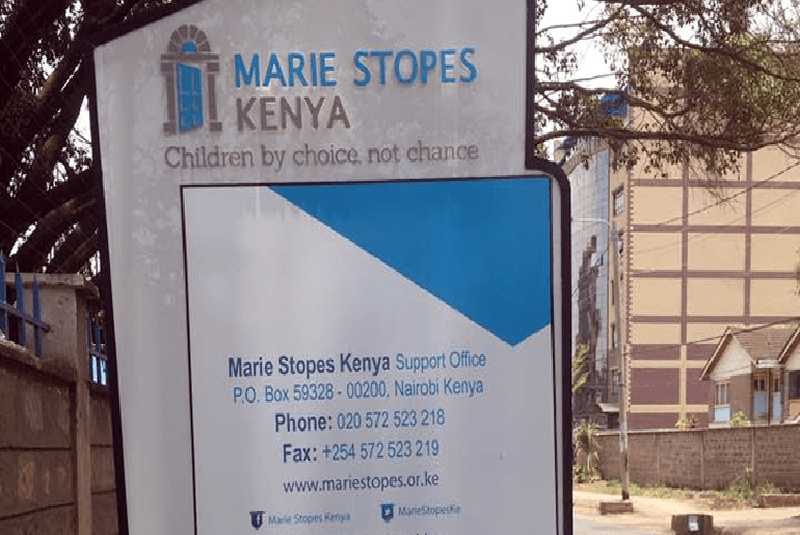News
Activists Challenge 2018 Ban on Marie Stopes Abortion Services in Nairobi Court

The High Court in Nairobi is reviewing a petition seeking to overturn controversial 2018 directives that banned Marie Stopes Kenya from conducting public awareness campaigns and providing abortion services across the country.
The case, filed by the Network for Adolescents and Youth of Africa (NAYA–Kenya) and Jackline Mary Karanja through the Centre for Reproductive Rights, challenges actions taken by three government bodies: the Kenya Film Classification Board (KFCB), the Kenya Medical Practitioners and Dentists Board (KMPDC), and the Director of Medical Services (DMS).
The petitioners argue that these institutions overstepped their legal mandates when implementing the ban.
They contend that KFCB, whose authority is limited to films and stage plays, had no jurisdiction to prohibit radio reproductive health awareness campaigns.
Similarly, they claim KMPDC unlawfully banned abortion services despite lacking oversight authority over facilities like Marie Stopes Kenya.
Most significantly, the petitioners assert that the DMS directive halting post-abortion care violated Article 43 of the Constitution, which guarantees access to emergency medical treatment.
Legal counsel Timothy Thondu argued that these actions were unconstitutional and infringed on women’s and adolescents’ fundamental rights.
“The bans stigmatise reproductive health services, undermine the Constitution, and leave women and girls unable to access lifesaving care,” the petitioners stated in their submissions.
The case has drawn support from several prominent advocacy organizations, including the Reproductive Health Network Kenya, FIDA–Kenya, KELIN, and the Kenya National Commission on Human Rights, highlighting the broader implications for reproductive healthcare access in the country.
However, government respondents, represented by lawyer Charles Kanjama, strongly defended their actions as both lawful and constitutional.
Kanjama argued that the directives fell within their mandate under the Public Health Act and emphasized that pre-2010 statutes remain valid under Section 7 of the Sixth Schedule of the Constitution.
“The petition does not directly challenge the validity of the statutes but merely presumes them unconstitutional,” Kanjama submitted to the court, maintaining that medical officers were properly empowered to regulate public health matters, including reproductive services.
The petitioners are seeking a declaration that the officials’ actions were unconstitutional and requesting that those involved be deemed unfit for public office for breaching good governance principles under Articles 10 and 232 of the Constitution.
After hearing both written and oral submissions from all parties, the court has scheduled the matter for further directions on December 5, 2025, setting the stage for a landmark ruling that could significantly impact reproductive healthcare policy in Kenya.
Kenya Insights allows guest blogging, if you want to be published on Kenya’s most authoritative and accurate blog, have an expose, news TIPS, story angles, human interest stories, drop us an email on [email protected] or via Telegram
-

 Grapevine2 weeks ago
Grapevine2 weeks agoRussian Man’s Secret Sex Recordings Ignite Fury as Questions Mount Over Consent and Easy Pick-Ups in Nairobi
-

 News7 days ago
News7 days agoTHE FIRM IN THE DOCK: How Kaplan and Stratton Became the Most Scrutinised Law Firm in Kenya
-

 Investigations1 week ago
Investigations1 week agoMulti-Million Dollar Fraud: Three Kenyans Face US Extradition in Massive Cybercrime Conspiracy
-

 Economy1 week ago
Economy1 week agoIran Demands Arrest, Prosecution Of Kenya’s Cup of Joe Director Director Over Sh2.6 Billion Tea Fraud
-

 Business1 week ago
Business1 week agoA Farm in Kenya’s Rift Valley Ignites a National Reckoning With Israeli Investment
-

 Africa2 weeks ago
Africa2 weeks agoFBI Investigates Congresswoman Ilhan Omar’s Husband’s Sh3.8 Billion Businesses in Kenya, Somalia and Dubai
-

 Grapevine3 days ago
Grapevine3 days agoA UN Director Based in Nairobi Was Deep in an Intimate Friendship With Epstein — He Even Sent Her a Sex Toy
-

 Politics2 weeks ago
Politics2 weeks agoSifuna, Babu Owino Are Uhuru’s Project, Orengo Is Opportunist, Inconsequential in Kenyan Politics, Miguna Says
















